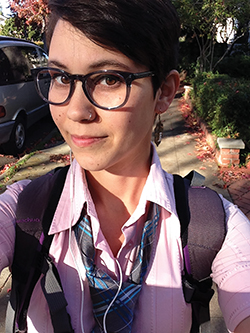Hodgkin Lymphoma Lymphoma Survivor
Young Adult Survivor Promotes Social Healing

Mallory Casperson had just lost her mother when she learned she had Stage IIA Hodgkin lymphoma. Just 24 years old, consumed with grief and involved in a competitive graduate program, she faced her diagnosis and treatment relatively alone. Today, Mallory and the team at Lacuna Loft strive to make sure no young adult cancer patient ever feels alone.
During graduate school, I had swollen glands on the right side of my neck for months. I took what felt like endless antibiotics to no avail. I was prone to sinus infections and still had my tonsils, so when more than one physician (including my mom’s oncologist) palpated my neck and weren’t concerned, neither was I. Finally, a doctor at my campus health center sent me to an ear, nose and throat (ENT) doctor, who offered an antibiotic, which I refused. I scheduled a follow-up for six weeks but didn’t go because my fiancé and I moved home to help care for my mom, who had been diagnosed with a brain tumor. A month after she passed away, we moved back.
I still had swollen glands, so I returned to the ENT. He noticed they were a “little bigger” and recommended taking one out surgically. I was hustled to scheduling. It took me by surprise, so I texted my dad. I hadn’t had any medical issues away from home and wasn’t sure what to do. Did I need to come home? He told me to schedule it, and he’d come to me.
I had surgery on Valentine’s Day. The doctor’s office called just two days later, asking me to come in right away. Much to my grad school advisor’s disappointment, I cancelled my office hours on campus and went in. At 24, I was diagnosed with Stage IIA Hodgkin lymphoma.
My fiancé and I were immediately taken in to see an oncologist. He recommended the standard protocol of chemotherapy and radiation therapy. For a second opinion and staging, I went to an oncologist at home. My dad, fiancé and future mother-in-law were all in the room with me when the oncologist recommended a clinical trial. It included the chemotherapy from the standard protocol but no radiation therapy. If I didn’t respond well, I’d have to switch to a more toxic chemotherapy that wasn’t considered standard.
I felt very much on the spot. Since no one had brought it up, I asked what would happen if I did nothing at all.
“Oh, yes,” she said, “this will kill you.” That would have been good to know up front.
She sent me to a reproductive specialist because there was a chance the treatment could make me infertile. Starting a family wasn’t even on our radar. I expected that to be a pretty standard meeting, but it was emotionally charged. I chose not to do any type of fertility preservation and opted for the clinical trial.
During treatment, I was fatigued, had mouth sores and was nauseated. I drank a lot of ginger tea and kept ginger chews on hand. Losing my hair completely was supposedly a given, but I didn’t, and I worried that my treatment wasn’t working because of it. It was, and after four months, I was officially NED (no evidence of disease).
My treatment ended as summer began, so I took a break. It was probably a crazy thing to do while recovering, but we celebrated with a trip to Disney World. I returned to grad school in the fall.
I didn’t expect the reception I got. From my advisor telling me he’d like to treat the situation as if nothing had ever happened and a colleague telling me “things sure were a lot quieter when you weren’t around” to people telling me how lucky I was to get “the good kind of cancer,” I felt completely invalidated.
I also didn’t feel like myself. Before, I trained for marathons and did salsa dancing, but now I didn’t have much energy. I was also worried about the competitive PhD program I was in. My husband (we were married by this time) continued to be very supportive, though he was busy with grad school and working. I didn’t have anyone else to talk to.
Everything came to a head, and I left school without completing the program. That was a blow. I’d planned and worked so hard to earn my PhD in engineering. I felt like my future was completely out of my control.
I began blogging. I had my first in-depth conversation with another young adult cancer survivor a full two years after being NED. After reaching out to other young survivors online, I learned that although I experienced some positive things, I’d missed out on others. I was never assigned a social worker, never attended a support group and never realized I was likely going through depression and anxiety. Most importantly, I realized I wasn’t alone.
Everything I learned felt very right. My mother-in-law, who had previously worked for a cancer support group, encouraged me to create an advocacy group. That was how Lacuna Loft started. We offer programs and resources for young adult cancer patients, survivors and caregivers, and free education and support through blogs, classes and workshops. “Lacuna” means a brief pause or hiatus, so the thought is that young adults with cancer will have a place to come to be with others facing the situations that affect our age group, such as fertility, different tumor markers and psychosocial issues.
Cancer causes a lot of things in life, and no one should feel alone during that time.


